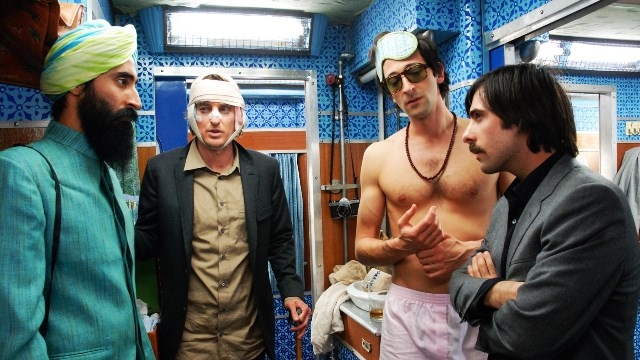“I’m Gonna Go Pray At Another Thing”: Wes Anderson’s The Darjeeling Limited
Wes Anderson wanted to make a film about India, a film set aboard a train, and a film about three brothers. He combined the three ideas and The Darjeeling Limited was born. Released in 2007 to generally positive reviews, the film was praised for its intimate look at brotherhood, its documentary-like filmmaking style, and for its quirky but understated humor. And yet the film is guilty of treating its India location as a mere backdrop, without really engaging with the optics of three rich white men trampling around a country that was once colonized by white men. I’m not sure how self-aware Wes Anderson is about how annoying people who say things like “spiritual journey” are. The Darjeeling Limited could be a satire of cultural tourism, but I’m still not positive how much of that is intentional.
The Darjeeling Limited stars Owen Wilson, Adrien Brody, and Jason Schwartzman (who co-wrote with Anderson and Roman Coppola) as Francis, Peter, and Jack Whitman respectively. The three brothers haven’t seen each other in the year since their father died. Francis is bandaged up after a bad motorcycle accident, Peter is an expecting father, and Jack is getting over a bad breakup. The trip is Francis’ plan to find their mother Patricia (Anjelica Houston), who is living in a convent in the Himalayas. Along the way, the Whitman brothers run afoul of the chief steward of the train (Waris Ahluwalia) and get kicked off. They’re stranded with their eleven bags, and must figure out how to get along.
The first half plays like every “white person goes to India to find himself” movie. Locals being inconvenienced by white people? Check. Brief interracial fling? Check. Trite, condescending observations about India? Owen Wilson actually says he loves the people of India after talking to about three people. The exoticization of India isn’t anything new, and perhaps Anderson is just trading in clichés that have been around since The Beatles discovered India in the 1960s. The Darjeeling Limited feels like a satirical self-parody of the hippie-era commodification of Indian culture, music, philosophies, and religions. Perhaps the Whitman brothers only know of India through that lens and Anderson is making fun of them for that. These men are so self-absorbed they are bickering about thousand-dollar belts in a house of worship.
However, the satirical elements in the film are betrayed by Anderson delivering these men the spiritual reckoning they craved. But it’s not through visiting temples. No, these white men witness the death of a boy and attend the funeral. Now they can appreciate their lives and each other, since they helped the boy’s two brothers bring the body back to their family. It’s a classic example of white salvation through brown pain. This is where Anderson puts the flashback to the Whitmans’ father’s funeral. Rather than look outward and see real Indians for the first time, the Whitmans still center this Indian family’s tragedy on their own lives.
Wes Anderson was influenced by the monumental work by Satyajit Ray and the Indian Merchant-Ivory films with Shashi Kapoor. Anderson licenses a number of gorgeous musical selections from films like Ray’s Charulata and the Merchant-Ivory classic Bombay Talkie. The music sets the mood for the bustling cities of India, though I doubt anyone involved in those older films meant for them to underscore the lives of privileged white people. I don’t see much thematic connection to Ray or Merchant-Ivory, which makes me think that Anderson’s understanding of Indian cinema is Criterion Collection-friendly and rather superficial.
There are some moments I found rather enjoyable. A scene in a busy marketplace is designed to look chaotic and it’s great. Future The Night Of star Amara Karan is charming in her interactions with Jason Schwartzman. The movie has a genial vibe if you’re not distracted by the clueless Orientalism. If you can accept India as a land of trains getting completely lost and bogus rituals with peacock feathers, then maybe this film can work. At the end of The Darjeeling Limited, the Whitmans leave India, leaving their baggage behind. I can think of no better metaphor for Westerners projecting their emotional labor onto India and then leaving without a second thought once they feel better.














